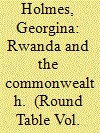| Srl | Item |
| 1 |
ID:
122187


|
|
|
|
|
| Publication |
2012.
|
| Summary/Abstract |
Dominant narratives of war in the Democratic Republic of the Congo and the Great
Lakes region have emphasised the use of mass rape as a weapon of war that is primarily used against women. Georgina Holmes argues the need to go beyond this reductionist interpretation: mass rape is perpetrated against women, men and boys, and is an extreme form of violence against the community which effectively constitutes 'genocide by attrition'.
|
|
|
|
|
|
|
|
|
|
|
|
|
|
|
|
| 2 |
ID:
107088


|
|
|
|
|
| Publication |
2011.
|
| Summary/Abstract |
As with most British media coverage in 1994, the BBC did not report genocide in Rwanda, preferring instead to depict political violence as tribal civil war and 'primitive' ethnic conflict. Yet when the international community declared that genocide had taken place, the BBC was quick to change its tack, moving away from reporting ethnic conflict towards memorialising genocide. Referring to the BBC's website, political discussion programmes and documentary films, the article considers how over time an institutional narrative on the 1994 genocide has developed. The author argues that the BBC has been required to reconcile the problem of depicting genocide-conventionally seen as modern, 'Western' political violence-in Africa. The ways in which the BBC has remembered Rwanda's genocide also conceal from view British foreign policy decision-making between April and July 1994. The author then considers how, since Rwanda joined the Commonwealth in November 2009, the BBC's reporting has shifted again-this time towards framing news in the context of democracy and freedom of speech.
|
|
|
|
|
|
|
|
|
|
|
|
|
|
|
|
| 3 |
ID:
170280


|
|
|
|
|
| Summary/Abstract |
Applying a Bourdieusian feminist practice theory approach to the study of norm implementation, this article introduces a fourth level of analysis, the embodied subject who is expected to be governed by peacekeeping norms. It does so by examining the training experiences of Rwandan tactical-level female military peacekeepers deployed in mix-gender contingents to UNAMID. It is argued that the pre-deployment training space is a field of norm contestation and negotiation, wherein gendered peacekeeper subject positions and gendered peacekeeping labouring practices are constructed and performed. The research findings suggest that by partially complying with the UN’s gender mainstreaming norms, the Rwanda Defence Force strengthens the military’s gender protection norms and establishes the sexual division of labour of the mission area. Trained to perform a scripted Rwandan female subject position, some women find they are not adequately prepared for the more challenging situations they find themselves in when working in multi-dimensional peacekeeping operations and devise alternative, informal training practices to better equip themselves prior to deployment. The case study draws on 65 depth-interviews with Rwandan military personnel, trainers and external consultants and non-participatory observations of field exercises.
|
|
|
|
|
|
|
|
|
|
|
|
|
|
|
|
| 4 |
ID:
178267


|
|
|
|
|
| Summary/Abstract |
Following its departure from the EU on 31 January 2020, the UK is focusing on strengthening its existing bilateral partnership with the African Union (AU). Assisting the AU in implementing its Women, Peace and Security (WPS) agenda provides one avenue to achieve this aim and supports the implementation of the UK’s own WPS agenda. Drawing on interviews with representatives from the AU, British diplomats and African in-country experts, Georgina Holmes assesses how the UK engages with the AU to facilitate gender-responsive, people-centred peacekeeping and reflects on how the AU could benefit from continued UK support.
|
|
|
|
|
|
|
|
|
|
|
|
|
|
|
|